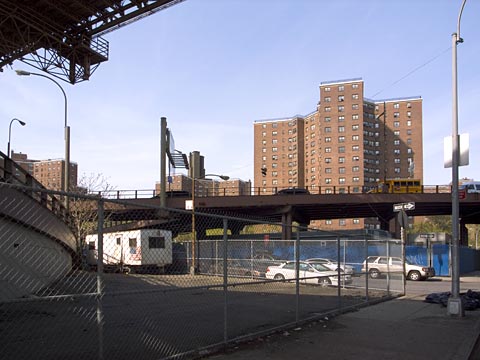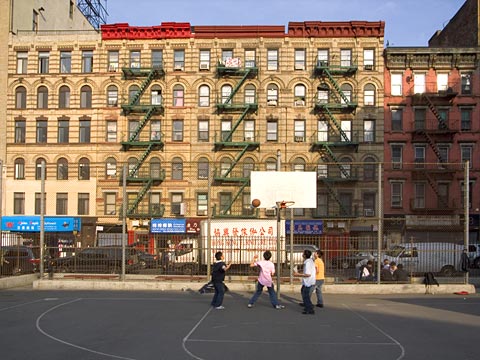After several mostly wet days, and lots of work on the computer, I returned to shooting on the Lower East Side. I took the subway down to City Hall, and walked along the approaches to the Brooklyn Bridge, the southern boundary of my project. At Front Street I noticed Photographic Gallery, ducked in briefly, and saw a show called “Unembedded,” photographs taken in Iraq by photojournalists who were not part of an official embed with U.S. forces. These are the kind of pictures rarely seen in American media both in their graphic depiction of the violence and in their attention to the lives of Iraqi people. I must confess to being jaded by the ubiquitous clichés of photojournalism. This group of photographs, while well-seen, does not avoid the familiar visual devices. On the other hand, these are courageous photographers who are trying to communicate the reality of the war, and I commend them for the effort.
Just down the street from the gallery I photographed the Brooklyn Bridge from an angle I recall vaguely shooting 25 years ago. Below the on/off ramps looking up to the stone tower on the Manhattan side. From there I walked out to the landscaped esplanade beneath the bridge, which did not exist in 1980. The immediate neighborhood is the former Fulton Fish Market now decamped to the Bronx. It’s another example of the gradual loss of rough and ready work from the island of Manhattan.

Smith Houses and Brooklyn Bridge ramps
I did another photograph looking up through the bridge ramps toward the Alfred E. Smith houses, one of the chain of vast urban renewal projects lining the East River. These once forbidding forests of towers have become far less intimidating in today’s New York. In this case, the buildings looked reasonably maintained, and the grounds had been freshly re-landscaped. I then walked uptown toward Chinatown where I would spend the rest of the afternoon.
Chinatown is a major subject all on its own, but in 1980 it seemed somewhat peripheral to the rest of the Lower East Side, so I didn’t focus on it. In the intervening years it has greatly expanded north and east taking in the old Jewish enclave along Eldridge and Forsythe on up to Delancey Street. As I recall, Chinatown once seemed an exclusively pre-modern expression of Chinese culture. But now, a cadre of hip young Asians mixes with the older generations. In the playgrounds, basketball has become a popular Asian sport, no doubt inspired by the success of Yao Ming of the Houston Rockets.
I did several photographs along Madison Street next to the Al Smith Houses and then moved north under the Manhattan Bridge. One particular ensemble of buildings was striking with strangely juxtaposed architectural types spanning almost 150 years. There is, of course, a whole world of photographs that could be taken within and about Chinese culture in New York. What is of interest to me is the way in which, over the decades, different ethnic groups have recycled the same streetscapes, the same buildings, adding and subtracting structures, each leaving its stamp before moving on.


Dear Brian Rose,
I am delighted to see your photography which is an invaluable
record of the way things are.
My present neighbourhood of Ridgewood Queens fits the idea that ongoing waves of immigrant groups have reshaped the way an area is perceived.I wish you were to explore Palmetto Street,Stockholm Street,Norman Street,parts of Myrtle all featuring amazingly good architecture designed and also executed by,originally,German immigrants and/or crafts people.The attention to detail in the brickwork is outstanding.So,are some of the double front doors.To see perfectly intact rows and rows of these houses is heartwearming.Walking down some of those streets is like walking around in Cologne with almost only Spanish being spoken now which adds
to the whole athmosphere a sense of
the surreal in the most positive way.